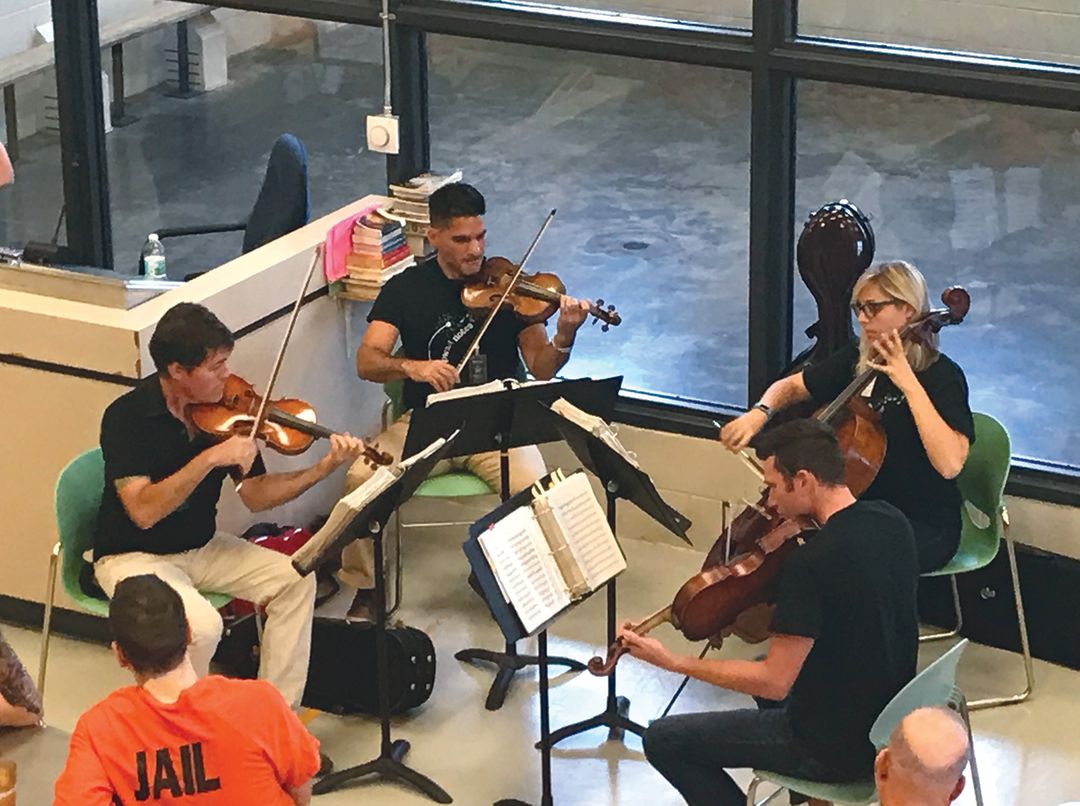Can Music Help Prisoners Dealing with the Stresses of Incarceration?

A musical group performs at the Sarasota County Jail while inmates listen.
Image: Courtesy Photo
“Music has charms to soothe a savage breast”—so goes the often quoted (and misquoted) phrase. But can music aid jail inmates in dealing with the stresses of their incarceration?
That’s the question addressed by a new program joining efforts of University of South Florida Sarasota-Manatee students and officials at the Sarasota County Jail. In performances this past spring, an acoustic guitar and violin duo playing gypsy jazz and a string quartet delivering a range of music from classical to contemporary played for inmates in the jail’s Recovery Pod. Early survey results of the first-time ever events were positive. “Inmates felt a sense of calmness and a reduction in stress and anxiety,” says USF assistant professor of criminology Dr. Jessica M. Grosholz.
The idea originated during Grosholz’s course on “Prisoner Reentry and Recidivism,” which she’s taught for several years. “I attended the Salvation Army’s annual celebration for the Sarasota County Jail Recovery Pod and became inspired to incorporate more hands-on experiences for my students,” says Grosholz. “I couldn’t give exams or have them write a paper and believe that they truly understood the experience of someone struggling with the cycle of addiction and confinement and release and reconfinement.”
After sitting in on recovery meetings and other sessions involving inmates, several of Grosholz’s students researched therapy ideas and discovered that a handful of correctional institutions had found success with music therapy programs.
Here in Sarasota, says corrections treatment specialist Sandra Goluch, “A lot of inmates believed they benefited from the performances and look forward to more opportunities. They interacted with the musicians in various ways. The musicians provided information about the type of music they played, the instruments they played, and the history behind the composers. A lot of the inmates related to different instruments in unique ways; I remember they were quite impressed with the cello, as to how much of an impact it had on the sound of the entire group.”
Forty-eight inmates are housed in the Recovery Pod, and all of them attended the performances. Some of them were still awaiting trial; others have been sentenced to varying lengths of time. Determining factors as to whether an inmate is housed in the pod, says Goluch, include “security level, behavior within the facility, and a desire to participate in recovery-oriented curriculum.”
Will the pod performances continue? That depends. The musicians taking part are volunteers, and right now, Goluch says, there are not any upcoming dates on the schedule.
But if you are interested in playing a session at the jail, or know musicians who might be, you can contact Goluch directly at (941) 861-4131 or [email protected].